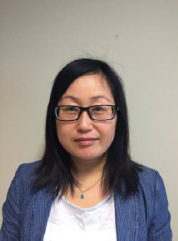
Professor Professor Zaiping Guo
University of Adelaide, Adelaide, Australia
Talk Title: Electrode and electrolyte design for high-performance aqueous zinc-ion batteries
Abstract: The rise of intermittent renewable sources, such as solar and wind, has spurred growing interest in electrical energy storage. Integrating grid-scale energy storage with renewable sources offers significant advantages in energy regulation and grid security. Zinc-based aqueous batteries (ZABs) have emerged as a promising energy storage technology for low-cost and large-scale applications due to the intrinsic safety of aqueous electrolytes and the highly desirable properties of the zinc metal anode, including its high theoretical capacity (820 mA h g−1 and 5855 mA h cm−3), low redox potential, and abundant resources.
However, the practical application of ZABs has faced challenges, including cathode degradation, uncontrollable zinc dendrite growth, and parasitic side reactions between the electrode and electrolyte, particularly under harsh conditions. In this presentation, I will discuss some of our recent advancements in enhancing the electrochemical performance of aqueous zinc ion batteries through electrode design and electrolyte optimization.
Biography of the Speaker: Professor Zaiping Guo is an Australian Laureate Fellow at School of Chemical Engineering, The University of Adelaide. She is also an Associate Editor for Chemical Science, a flagship journal of the RSC. She was elected to the Fellow of Australian Academy of Science and Australian Academy of Technological Sciences and Engineering in 2023. Her research focuses on the design and application of electrode materials and electrolyte for energy storage and conversion, including rechargeable batteries, hydrogen storage, and fuel cells. Her research achievements have been recognized through numerous awards, including an ARC Queen Elizabeth II Fellowship in 2010, an ARC Future Professorial Fellowship in 2015, an ARC Laureate Fellowship (2021), and the Clarivate Analytics Highly Cited Researcher Award in 2018, 2019, 2020, 2021, 2022, 2023 and 2024. She was also awarded 2020 NSW Premier's Prizes for Science & Engineering for Excellence in Engineering or Information and Communications Technology.
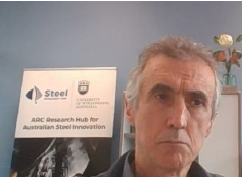
Professor Paul Zulli
Director, Australian Steel Manufacturing Research Hub
School of Mechanical, Materials, Mechatronic and
Biomedical Engineering
University of Wollongong, Australia
Biography of the Speaker: Dr Paul Zulli is an internationally recognised leader in steel
manufacturing research, technology development and
deployment, combining over 35 years of technical and
management experience across steel and ferrous minerals industries. He is a respected leader
of multi-disciplinary teams, with an established reputation for delivery of tactical and strategic
project outcomes into operating businesses. An influential senior manager, he has been active
in seeking to bridge the gaps between academic research products and innovative industrial
solutions, with the goal to provide value-adding and sustainable outcomes. His specific areas
of scientific reputation include development and implementation of simulation methods and
operational systems concerned with complex manufacturing processes in difficult industrial
settings, coupled with experimentation, pilot and plant trials activities. He is an elected Fellow
of the Australian Academy of Technological Sciences and Engineering. Based at the
University of Wollongong, he was appointed Director of the ARC Research Hub for Australian
Steel Manufacturing in March 2017 and is now leading the second hub.
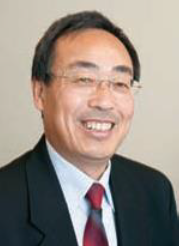
Professor Geoff Wang
Faculty Director of China Research Partnership
Executive Director of the Baosteel-Australia Joint R&D Centre
(BAJC)
Advisory Director of HBIS-UQ Innovation Centre for Sustainable
Steel (ICSS)
School of Chemical Engineering
Faculty of Engineering, Architecture and Information Technology
The University of Queensland, Australia
Biography of the Speaker: Geoff Wang received his PhD in Metallurgical Engineering from
the Northeastern University, Shenyang, China in 1990, and then
worked in Wuhan University of Science and Technology for 5 years and then about 2 years at
University of New South Wales. He joined the University of Queensland in end of 1996 until
now. His research activity and interests are directed towards developing energy and
environmental technologies dealing with the coal and steel industries. He has been active for
research in clean coal energy and low-carbon technologies such as pulverized coal injection
into blast furnaces, modelling in ironmaking and steelmaking, hydrogen production through
lower emission coal gasification, coal seam gas recovery and CO2 sequestration, and in recent
years, the chemical and electrochemical conversion of CO2 to fuel or reusable chemicals,
carbon recycling in ironmaking blast furnace and the hydrogen shaft furnace.
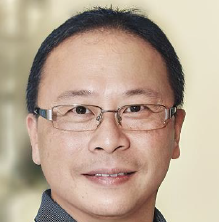
Professor Jie Bao
Director, ARC Research Hub for Integrated Energy Storage Systems School of Chemical Engineering,
University of New South Wales, Australia
Biography of the Speaker: Professor Jie Bao is a Process Control expert of international repute, particularly in dissipativity- and passivity-based process control. He is the Director of ARC Research Hub for Integrated Energy Storage Systems and leads the Process Control Research Group, School of Chemical Engineering. He has been awarded over AUD 18 million competitive research funding (excluding infrastructure funding) in the field of process control, control theory and applications, including 13 Australian Research Council Discovery Projects/ARC Large grants, 1 CSIRO National Flagship project, 5 ARC Industry Research Hub Projects, and several major industrial research grants. His research interests include dissipativity theory-based process control, networked and distributed control systems, system behavioural theory and control applications in membrane separation, flow batteries, coal preparation and aluminium smelting. He has published extensively in major process control and chemical engineering journals. He is an Associate Editor of Journal of Process Control (an International Federation of Automatic Control affiliated journal), Digital Chemical Engineering (an IChemE affiliated journal) and Journal of Franklin Institute (established in 1826). He is appointed by the ARC to the College of Experts. He also serves on the International Federation of Automatic Control Technical Committees: Chemical Process Control (TC6.1); Mining, Mineral and Metal Processing (TC6.2).
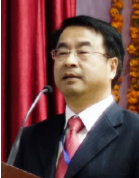
Dr Renhu Pan
Managing Director, Zhejiang Ruike Enviro-tech Engineering Co., Ltd.
Biography of the Speaker: Dr Renhu Pan received his PhD degree in Pneumatic Conveying of Bulk Materials from University of Wollongong, Australia in 1993. He was a lecturer at the Department of Mechanical Engineering, the University of Newcastle, Australia from 1998 to 2002. In 2002, he jointed and had been a vice-president of Fujian Longking Co. Ltd., China until 2023, being totally in charge of Bulk Materials Handling (BMH) business. Currently he is a Managing Director of Zhejiang Ruike Enviro-tech Engineering Co., Ltd. and Industry Expert (Professor) of Xiamen University, China. His main research interests focus on BMH (mainly pneumatic conveying of fly ash up to 1000MW units, wet and dry FGD ash, limestone and mill rejects, pipe conveyor and dust suppression) and the application of AI and digital control in BMH. So far over two thousand BMH (including trouble shooting) projects have been conducted successfully.
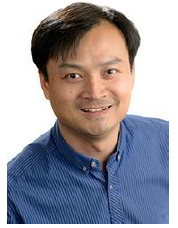
Professor Jun Huang
Director, The Laboratory for Catalysis Engineering School of Chemical and Biomolecular Engineering
The University of Sydney, Australia
Talk Title: Development of Highly Selective Nanocatalysts for CO2 Upcycling
Abstract: CO2 hydrogenation to C1 chemicals has attracted significant interest due to the increasing demand of energy and global warming. Continuous efforts in the field of heterogeneous catalysis have revealed that the CO2 hydrogenation is structure-sensitive in monometallic catalysts. However, the structure-performance relationship fundamental research in bimetallic catalysts is a big challenge because the well-defined bimetallic structures and the corresponding mechanism are more complex than monometallic ones. Here, with the construction of TiO2 supported Ni-Ru bimetallic catalysts, evidenced by advanced microscopy characterizations, the alloyed and non-alloyed structures have been synthesised for the hydrogenation. The in-situ experiments show that the Ni-Ru bimetallic structures act like an 'H atom-valve' via controlling the H2 spillover which can completely switch the CO2 hydrogenation selectivity during the reaction. These findings bring a fundamentally new understanding of the selective hydrogenation on bimetallic nano-catalysis and the structure-performance relationship in controlling the 'H atom-valve' for many important chemical processes.
Biography of the Speaker: Professor Jun Huang received his PhD from University of Stuttgart in 2008. After his postdoctoral fellow at Georgia Institute of Technology and ETH Zurich, he joined the University of Sydney as a permanent faculty in 2010, moving up the ranks to Professor at Sydney. Jun is the Academic Leader of University of Sydney – Zhejiang University Joint Lab on Sustainable Environment. His research is to develop emerging nanoporous catalysts and supported nanometal catalysts for more attractive, practical, and cleaner processes using in situ characterization techniques coupled with innovative reaction engineering. Jun has published over 250 journal publications in high-rank Journals. He has been awarded over AU$ 12m research grants and many prestigious awards including ACS Sustainable Chemistry & Engineering Lectureship Award, CCST-IChemE Carbon Capture Outstanding Achievement Award, Australia's Most Innovative Engineer, and the Vice-Chancellor's Awards for Excellence Outstanding Research. Jun is the Editor-in-Chief of Materials Today Sustainability, Editorial Group Member of National Science Review, and the Editorial Board member of other high-rank journals.